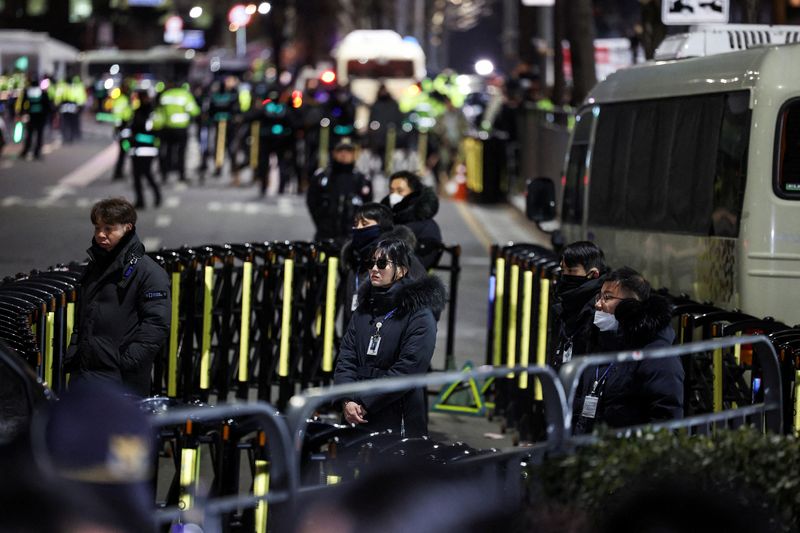
By Hyunjoo Jin
SEOUL (Reuters) – The man who played a key role in preventing investigators from arresting ousted South Korean President Yoon Suk-yul has been thrust into the spotlight in the political crisis sparked by Yoon's brief declaration of martial law last month.
Park Chung-joon, who reports directly to Yoon, was instrumental in denying investigators' attempt on Friday to issue an arrest warrant for Yoon, leading to a six-hour standoff at Yoon's official residence.
Presidential guards and military forces prevented authorities from arresting Yoon on charges of rebellion under the arrest warrant, which remains in effect until Monday. The anti-corruption body leading the police investigation said on Friday it was working to determine its next steps.
Yoon's declaration of martial law on December 3 caught South Korea by surprise and led to his isolation and suspension on December 14. The president's political fate is in the hands of the Constitutional Court.
A struggle over his legal fate pits a group of law enforcement agencies against Yoon's forces – with Park in a pivotal position.
Park, who was appointed by Yoon last September, played a role in preventing investigators from executing search warrants for the president's offices and residence, citing national security.
“The Presidential Security Service exists only for the absolute safety of the security objective,” Park said in a message on the agency’s website, adding that its mission of protecting the president “at every moment” should leave no loopholes.
This reasoning was used to reject efforts on Friday to arrest Yoon, on the grounds that investigators exceeded the bounds of security laws and injured some security personnel.
“Out of control”
Critics worry that Park's service is excessive.
“The Presidential Security Service is a dangerous institution whose power can spiral out of control,” said Han Seung-won, a professor of police administrative law at Dongshin University.
Since only the president has the authority to control it, the security apparatus could abuse its power and turn into the president’s private army.”
Anti-corruption watchdog, the Senior Officials Corruption Investigation Bureau, said it had to call off the arrest attempt on Friday due to concerns for the safety of its staff.
The CIO said that Yoon's security apparatus and the forces under his control outnumbered the officials who arrested him. At one point, Yun's personnel were linked in a human chain of about 200 people to block access to Yun and his official residence, while buses and military vehicles were also used as barricades, she added.
Police said on Friday that they would investigate Park on charges of obstruction of justice, and asked him to appear for questioning. He refused for the time being, saying that he could not stay away from work even for a moment at this critical time.
The security service said that Park and his deputy were in talks to provide a response to investigators at a later date.
On Saturday, police requested his attendance on Tuesday.
Yoon's lawyers contend that the CIO lacks the authority to investigate the insurrection, making the arrest warrant illegal.
The court approved the arrest warrant, the first against a sitting president, on Tuesday after Yoon ignored repeated summons for questioning.
Controversial history
Critics of the presidential security service describe it as a relic of the days of South Korea's strongmen, who ruled until the late 1980s.
It was placed under the direct control of the president during the days of military rule in the 1970s and 1980s, and was headed by loyal aides who wielded enormous power.
After then-President Park Geun-hye was impeached in 2016, lawmakers, who described the service as the “brainchild of the authoritarian military regime,” proposed changes to transfer it to the police agency.
They also sought to demote its president, but reform efforts appear to have stalled.
Park's predecessor in the presidential security service was Kim Young-hyun, a close ally of Yoon, who left his post in September when he was appointed defense minister.
Kim has since resigned from his last post and has been charged with rebellion, accused of a key role in recommending and preparing the attempt to implement martial law.
The declaration, which Yoon canceled six hours later when challenged by the opposition-controlled parliament, bans political activity and seeks to control the media.
Park, a former senior police official, failed in two attempts to enter parliament in 2012 and 2016, graduated at the top of his class from the Korea National Police University, and rose to become deputy chief of the National Police Agency in 2011.
In 2012, Park Geun-hye helped the governor in her successful presidential bid, then became vice president of presidential security until 2015.
At the time of Park Chung-joon's appointment to head the presidential security service, Yoon's chief of staff said he would help build an “advanced security system.”

The opposition demanded his arrest because he prevented Yoon's arrest and urged an investigation into his alleged role in declaring martial law.
He was previously questioned as a witness in the investigation into that ad, and denied the allegations, according to media reports.







